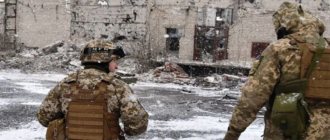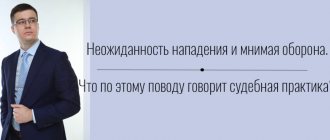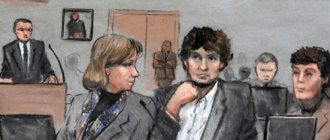The bulk of latent (hidden) crimes are detected in Russia during operational investigative activities (ORM). First of all, we are talking about bribes and drug trafficking. These crimes are usually recorded during an operational experiment and test purchase - operational activities permitted by law, but, in fact, are a provocation for receiving a bribe or selling prohibited substances. The arguments of the perpetrators in such a situation look extremely simple and clear: if there had been no provocation, there would have been no crime. But Russian legislation is reluctant to accept such an argument as “provocation”. The only thing that reduces the limits of liability is the qualification of the act as an attempt at the corresponding crime, due to which the possible punishment is limited to ¾ of the maximum term or amount for the completed crime.
Provocation of a crime
When investigating any criminal case, the mandatory signs of a crime must be established - the form of guilt, the nature of the actions or inaction of the culprit, the consequences that have occurred, etc. The reasons and motives that prompted the person to break the law will also be identified. If the will and desire to break the law was influenced by the actions and actions of other persons, provocation of a crime may be established.
Let us highlight the key features that characterize provocation of a crime under the Criminal Code of the Russian Federation:
- provocation consists of active actions (incitement) influencing a citizen’s decision to commit an unlawful act - in the absence of such external influence, the crime could not have been committed;
- provocative actions are aimed at artificially forming elements of a crime and the evidence base;
- if the fact of provocation is confirmed, the actual culprit of the crime is not exempt from punishment, however, all illegally obtained evidence will not be taken into account for prosecution.
Note!
The most common type of provocation is the illegal actions of law enforcement officers. However, instigators with a different status, including ordinary citizens, will also be held accountable.
Do you have any questions?
To get the most detailed advice on your issue, you just need to follow any of the suggested options:
- Request a consultation using the form
on our website - Or just call the number: 8 800 350-83-74
There is no legislative definition of provocative actions in the Criminal Code of the Russian Federation. The only mention of provocation to commit a crime is contained in Article 304 of the Criminal Code of the Russian Federation, which provides sanctions for incitement to a bribe or commercial bribery in the field of procurement activities. It is by the signs of this criminal act that the general features of the provocative actions mentioned above can be determined.
When can provocation be established? The answer to this question is partially contained in Resolution of the Plenum of the RF Armed Forces No. 24:
- provocative actions are aimed at deliberately and artificially forming signs of a crime, collecting and providing evidence of an unlawful act, and subsequent blackmail;
- provocation can be established in case of violation of the rules of operational-search activity, when police officers do not record or prevent criminal behavior, but secretly or openly facilitate its commission;
- elements of provocation must influence the will and free decision to break the law. If a citizen obviously has a real intent to commit a crime, and he himself has decided to implement it, there are no provocative actions.
The consequences of provocation may differ significantly from the status of the perpetrators and other participants in the crime. The norms of the Criminal Code of the Russian Federation and the Code of Criminal Procedure of the Russian Federation recognize the admissibility of evidence collected in compliance with all requirements of the law, including during operational investigative activities. If such evidence was obtained through conscious and intentional provocation or incitement to commit an act, it cannot be taken into account when assigning punishment and must be excluded from the case.
In practice, when cases of provocation are identified, the following consequences occur:
- every procedural action carried out with an active influence on the will and decision of the offender must be declared illegal - all protocols, acts and other procedural documents drawn up in violation of the law will automatically lose force;
- if procedural documents and evidence are excluded from the indictment base, the grounds for criminal prosecution may be completely eliminated;
- if a provocateur or instigator violated the law by his actions, he himself is subject to liability under the Criminal Code of the Russian Federation - the type and size of sanctions will depend on the severity of the consequences.
Proving the fact of provocation is extremely difficult. To do this, it is necessary to justify the citizen’s lack of initial intent to commit a crime or decision to translate such a plan into reality. Evidence of such a fact may include testimony of witnesses, written documents, certificates and characteristics about the citizen’s lifestyle, his exemplary behavior, etc.
Responsibility under the article of the Criminal Code of the Russian Federation for provocation of a crime
As stated above, liability for provocation of a crime is directly provided for only in Art. 304 of the Criminal Code of the Russian Federation. For provoking a bribe or commercial bribery, the guilty person will be punished with a fine of up to 200 thousand rubles, imprisonment for up to 5 years, as well as other sanctions. If the provocateur was a police officer or other official, an additional measure of sanctions would be deprivation of the right to hold certain positions or conduct certain activities.
If the provocation was associated with the commission of other crimes, the guilty person will be punished for incitement within the framework of certain elements of the Special Part of the Criminal Code of the Russian Federation. The sanctions for such incitement will be significantly less than for the main crime. If police officers are found to have incited a crime, they will be punished in the following areas:
- for one of the elements of malfeasance - for example, exceeding official powers provided for by the nature of the service, or for violating the rules for conducting operational-search actions;
- as part of disciplinary liability, guilty persons may be dismissed from service in the Ministry of Internal Affairs;
- If the provocation causes harm and damage to citizens, the instigator will be obliged to compensate it in full.
If all evidence of guilt in committing a crime was obtained through provocative actions, the citizen can avoid punishment by terminating the criminal case.
What is the difference between provocation and falsification?
These are two completely different concepts. In case of provocation of a crime, interested parties create all the conditions for the citizen to develop criminal intent. As a result of this, he commits a crime and law enforcement agencies have evidence of its commission, the presence of intent in the actions of the perpetrator, as well as his involvement in the crime.
Falsification of evidence can occur in the absence of a crime. Another option is that a crime was committed, but the suspect has nothing to do with it. This is also evidenced by the lack of objective evidence and other data linking him to the crime. But in order to quickly investigate the case, unscrupulous law enforcement officials may falsify evidence in order to bring the innocent person to justice.
Provocation of a crime by police officers
When conducting operational-search actions, it is prohibited to incite, induce or induce the commission of illegal actions. This rule is contained in Art. 4 of Federal Law No. 211-FZ. When identifying the fact of a crime or preparation for it, police officers are obliged to stop illegal actions, intervene in criminal behavior or record all the circumstances of the violation. To distinguish between legitimate operational investigative actions and provocation on the part of police officers, the following principles are used:
- any form of intervention by police officers that is provocative and inciting is illegal, and evidence obtained in this way violates the principles of fairness in criminal liability;
- It is not a provocation to carry out operational search activities aimed at identifying signs of a crime, its suppression or prevention;
- if a citizen decided to commit an act only under the influence or pressure of police officers, the fact of provocation will be confirmed.
The most common type of provocation on the part of employees of the Ministry of Internal Affairs is inducement to purchase or distribute narcotic substances. In this case, all participants in the drug trafficking transaction may be police officers. The case of purchasing narcotic substances from police officers is not a provocation if the buyer intended to receive them from any person and was consciously looking for a distribution channel.
Is it possible to obtain evidence through provocation?
The Code of Criminal Procedure of the Russian Federation prohibits the use of provocation of a crime to obtain evidence. In practice, in order to invalidate evidence, it is necessary to confirm the fact of provocation in the process of investigative and operational search actions. To do this, they use interrogation of law enforcement officers, as well as verification of data collected during the search process.
Did they plant drugs?
There are suspicions of planting drugs in a number of cases by future defendants:
Dymchenko Tikhon Vladimirovich (born June 22, 1995). It was committed against Tikhon. according to a number of estimates, a provocation under the leadership of Lieutenant Colonel of the Ministry of Internal Affairs Igor S. He is currently, by the way, accused of planting drugs, as well as fabricating criminal cases under Article 228 and 228.1. The lieutenant colonel is under arrest in pre-trial detention center-4 in Moscow. His criminal case is actively covered in the media.
Meanwhile, the above-mentioned young man (many consider him innocent) is serving a long sentence. Although no drugs were found on him. An empty pack of cigarettes was thrown to Tikhon. The examination showed that there were traces of amphetamine on the cellophane from this pack. In other words, he basically did not have the weight of the drug for which criminal liability arises. Nevertheless, Tikhon was imprisoned for 10 years and 6 months. For what?
Borisov M. (surname changed), a kind, sympathetic young man, lent a friend 2 thousand rubles. A friend called unexpectedly and offered to meet to give a thousand rubles. During the meeting, while transferring the amount, operatives suddenly appeared, who, having tied up Borisov, planted drugs (as social activists believe) in his pocket. Then everything was like Shevchuk’s - threats to the family, etc.
Borisov did not admit guilt, but in the end he still received 10 years of strict regime.
The Case of Three Friends
Kulikov Stanislav and Chuiko Andrey have been friends since school. The summer of 2012 did not foretell anything terrible. Chuiko has a young family, a one-year-old child. Kulikov’s young common-law wife was pregnant and a wedding was planned.
Everything collapsed one night when operatives detained three friends. At the same time, drugs were planted on Kulikov (as the defense believes).
In the case of Chuiko and Kulikov, the Moscow prosecutor's office has currently initiated an investigation based on the materials of the criminal case. The investigation has been going on for two years now, and there are obvious violations in the case. However, the Ministry of Internal Affairs of North-Eastern Administrative District of Moscow, which is conducting this inspection, is actually playing for time. The third accused in the case is now wanted.
The prosecutor's office also submitted a submission to the Moscow City Court about the contradictions in the examinations that exist in the case. The Court of Cassation did not consider this issue.
Shevchuk Arkady Nikolaevich (born March 21, 1981). On March 17, 2016, Shevchuk was at home with his family (he has a wife and two small children). In the evening, his employer, with whom Arkady had previously terminated his work contract, called him on his mobile phone.
The woman asked Arkady to go down to the car, allegedly she accidentally left something there. It was late, Arkady suggested disabling the car alarm so that she could pick up her belongings herself. However, the woman insisted that he go out himself and personally open the car.
Arkady left, telling his wife that he would return soon. However, he returned only a few hours later, accompanied by operatives, covered in blood, with torn outer clothing. The operatives beat him on the street, took him to some vacant lot, and managed to break into his apartment. Then they conducted a search (according to available information, illegally) and allegedly found something. Before the examination, the investigators' report stated that marijuana was found in the apartment.
Then Arkady was taken to the department. The Federal Drug Control Service officers kept him there. When he was taken from the department to a temporary detention center (IVS), the detention center staff did not risk accepting him in a beaten state. They sent Shevchuk in this form to Hospital No. 20 in Volgograd for an MRI.
Based on the crime complaint from Arkady, social activists conducted an investigation, which established the following:
1. At the time of the call to Arkady, his former employer had already been detained. According to the documents, her phone was taken from her. The operatives admitted that they asked her to call and persuade Arkady to go outside. But this confession was given after the verdict.
2. A printout of telephone calls confirms the fact that the former employer called.
3. In Shevchuk’s case, there is a conclusion from a medical officer of the temporary detention facility that he allegedly received bruises on his body and face during a fall. After an appeal from social activists, an examination was carried out, which indicated that the blows Shevchuk received could not have been received during a fall. The blows were caused by some kind of blunt object.
During the judicial investigation, Shevchuk repeatedly appealed to the prosecutor with a request to consider a complaint about his beating and coercion to conduct a search in his apartment. However, these appeals were ignored.
Arkady does not plead guilty to the crime charged against him. Moreover, his former employer testified at the trial (according to the protocol) that Shevchuk did not sell her drugs.
Shevchuk received another refusal to initiate a criminal case against operational officers.
How do courts react to provocations?
In Russian courts, the problem of provocation of crimes is often not noticed and ignored. The practice of considering cases is based on trust in the statements of police officers. International law requires, on the contrary, that the results of operational investigative work be provided to the courts, against which the motives and grounds for the actions of law enforcement officers can be verified.
This is the position of the European Court of Human Rights. His decisions, according to Article 413 of the Code of Criminal Procedure of the Russian Federation, are the basis for reviewing cases. The ECHR notes, based on the consideration of a number of claims by Russian citizens, that the problem with provocation of crimes in Russia is of a structural nature.
How is the accused provoked?
In cases of drug trafficking, the provocateur is an acquaintance of the police or a person detained with drugs. In exchange for a promise to mitigate the consequences for him, he agrees to induce another person to give or sell him the drug. This can happen in person or over the phone. The entire communication process is recorded by law enforcement officers, thereby obtaining evidence of a crime.
Another option for provoking a crime under Article 228.1 of the Criminal Code of the Russian Federation is to conduct a test purchase. It is common practice to conduct several such purchases in order to confirm the regular nature of criminal activity. In this case, it turns out that law enforcement officers do not stop the commission of crimes, but give the perpetrator the opportunity to repeat them again and again.









